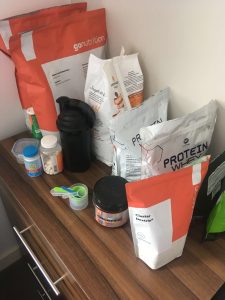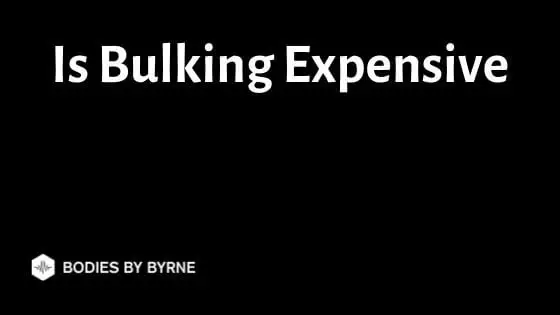Bulking is pretty much an essential part of building muscle in the long term. As a beginner just lifting weights and engaging in resistance training is enough to kick start the muscle building process.
As you get stronger and build more lean muscle mass however, it then becomes increasingly difficult to keep adding more muscle and this is where a dedicated bulking phase comes in. You consume a caloric surplus for an extended period of time in order to facilitate muscle growth.
There are a few methods, these include lean bulking, dirty bulking and a bulk and cut approach and while all have a slight difference in method the outcome is the same which is consuming more calories than you burn.
The majority of people love a bulk, the dieting restrictions are less draining (both mentally and physically) and your energy and strength go through the roof in training so surely it all seems great.
Well unfortunately there are also some downsides when it comes to bulking, these include having a low appetite, gaining too much excess body fat and the fact that bulking can be expensive which is the key topic for this article.
Is bulking expensive? Bulking is expensive if you don’t track your spending on food and don’t compare the cost per gram of a food item against different food groups and macronutrients. It can also be expensive if you don’t know your calorie requirements and end up over consuming.
In this article I’m going to get into the basic strategies that you can use to make sure your bulk is as successful as possible while also being easy on the wallet.
Is bulking expensive
The question of whether bulking is expensive is becoming more and more frequent as the cost of organic produce goes up while the cheapest foods are filled with junk calories that offer no macronutrient density.
Your first thought might be to buy the cheapest foods possible however this is not a solution to your bulking problem. It is an important factor though and that is why I’ve produced this article on how to bulk on a student budget.
In that article I basically lay out the cheapest possible bulking foods that you can get that will give you the biggest bang for your buck. I’m not a student but weighing 185lbs I consistently bulk on £23-£35 per week in the UK and this isn’t with the intention to save as many pennies as possible.
It just so happens that I like chicken and tuna which are significantly cheaper than steak and salmon. You might think that is a strange comparison but it’s a simple strategy that will save you a lot of money when bulking.
That’s what this article is going to focus on, making sure you don’t spend more than you need to while bulking without necessarily needing to do a weekly shop with a calculator in hand.
How to Bulk up Fast and Cheap
There are two main things that around 90% of people want to do when bulking and that is bulk up as fast as possible while doing so as cheaply as possible.
If this is the first time you’ve come across my content then you need to know that I’m not a fan of shortcuts when it comes to physique development. If you want to bulk up fast then the main thing that you’ll find increasing in size will be your midsection.
Getting stronger in the gym and consuming a calorie surplus over 6-12 months is what builds muscle, if you rush the process then you are going to gain a lot of excess body fat which is going to take even longer to burn off in the process.
Therefore you need to focus on a solid strategy for long term growth and it all starts with a consistent diet plan (unfortunately you do need some dieting structure even when bulking).
Know Your Bulking Macros
The biggest issue when overspending on a bulk is actually caused by not knowing your macros or calorie requirements and eventually overeating. Eating more food than you require to build muscle is the main reason that you think bulking is expensive.
In order to build muscle a calorie surplus is all that you require and the size of this surplus is key to both minimizing spending and also fat gain. On average, a calorie surplus of 300kcals is enough to facilitate muscle growth by ensuring a surplus of nutrients are available while also being low enough to minimize excess fat gain.
This does take some testing in the first few weeks so It might be worth starting with a surplus of 100-200 calories to see how your body adjusts but equally don’t be surprised if you need to go as high as a 500 calorie surplus.
The key is to test and adjust over time. The reason you are finding bulking expensive if you read this article is more likely becuase you’ve heard the hardcore lifter preaching that you need to eat as much as you possibly can to build muscle.
This is a very outdated way of thinking and unless you are some performance enhancing “supplements” (I think you know what I mean) then your body simply can’t utilize such a high surplus amount of calories efficiently.
When you are getting into a calorie surplus as high as >1000kcals then you are going to be negatively impacting your progress and spending a lot of money that you don’t need to. If you don’t know what your daily calories should be then I highly recommend checking out this article here.
It’s an in depth guide to bulking without counting calories and will give you the calorie requirements you need and some additional information if you don’t want to spend all day on Myfitnesspal.
What I will say though is that I’m a huge fan of Myfitnesspal and the technology available to us, if you can track your macros daily then you can see where you might be overconsuming in terms of calories and ultimately make a saving.
Buy In Bulk
The next thing you need to focus on when reducing the financial cost of a bulk is to start buying in bulk. I know I’m going to end up confusing myself with the amount of times I say the word ‘bulk’ but stay with me on this.
Convenience stores are popping up more frequently and in general as a society we the options available now are focused around speed and convenience. Who has time to make a sandwich for work anymore when you can get one as part of a meal deal for £3 (again UK pricing).
When bulking you also feel that you should have some sort of bulking food on you at all times so might seek out the fresh food and ready made sections of the supermarket. You can also get individually bagged microwave vegetables, pre sliced vegetables and even fully cooked whole chickens.
Whilst all of this is very convenient it also comes with a cost, for the time you save not having to cut or cook your food you pay for it in terms of a much higher cost. In that example a bag of 4 x 125g microwaveable frozen vegetables come in twice as expensive as a 1kg bag of frozen mixed vegetables.
Double the cost for half of the quantity is not going to do you much in the way of making your money go further on a bulk. Another example is a microwaveable sachet of oats that again come in twice as expensive at half the quantity of a regular large bag of steel cut oats.
Microwaveable sachets of rice again double the cost at half the price of a 1kg bag of white rice. The list goes on and on and the more decisions you make based on convenience and smaller portion sizes the higher the cost you pay in weekly receipts.
Therefore go to your nearest Costco or frozen food store and start buying your food in bulk. A £10 bag of chicken breast might seem like an expensive upfront cost but when you consider the duration of time it will last then the cost per gram is significantly less.
Carb sources are your biggest savers here, as mentioned the big tubs of steel cut oats and bags of rice are such a minimal cost when bought in bulk and the only thing you sacrifice is some convenience in the process.
Buy Unbranded Groceries
Another thing your focus should be on when bulking is your macronutrient intake. For maximum muscle growth you want to hit your daily macro requirements and because we are talking about macronutrient makeup of a food choice this is what you should be looking at when adding items to your basket.
Did you know that you pay for branding on food and not a specially made ingredient in a large number of cases? I’m not a conspiracy theorist out to get the corporations but it’s basic economics known as white labeling.
For a company to set up their own manufacturing process is a very costly process, especially when there are already factories that produce these goods in bulk. Take cereal as an example, when you look at supermarkets that have their own brand cornflakes where do you think these come from?
If you think about all the own brand products that a supermarket has and then consider the number of supermarkets in a specific region, then they would need thousands of factories just to produce the range of own brand products that they are selling.
That is just not a good business model and therefore in the majority of cases the own brand product and well known brand are likely using the same manufacturer and in some cases the brands sell the unbranded product directly to the supermarkets.
It’s the same with clothing, the brands don’t make their own garments, they pay a factory overseas who also produce clothing for a range of other rival brands. The concept is called economies of scale and white labelling.
It’s easy to think that I’m against branding which simply isn’t true, of course certain brands make certain enhancements to the basic product to stand out in the market, Coca Cola tastes significantly better than a cheap soda alternative so that isn’t the point of this section.
My point is that 1g of carbs from rice is 1g of carbs regardless of whether it’s a supermarket basic range or Uncle Ben’s premium boil in the bag range. Therefore with certain food groups you need to compare the macros and make informed decisions based on this.
Bulking is definitely going to be expensive if you only buy premium brands that offer the same macronutrient values as a lower priced store branded product. Again I’m really not trying to get you to live the frugal lifestyle counting every penny (I’m not a financial advisor selling money saving tips).
What I’m trying to emphasise is that if your bulk requires you to have 100g carbs post workout and your food of choice is cereal then just consider getting the unbranded rice puffs and save yourself the money in the process. Your muscles don’t care whether or not there is a cartoon character on the box so neither should you.
** Disclaimer – I’m sitting here writing this with a Starbucks mug so It’s very much a case of do as I say and not as I do!

Avoid Expensive Supplements
Finally, If you are finding that bulking is expensive but spending in excess of £100/$100 per month on supplements, then you really need to reassess your thought process because supplements are luxury items when bulking, not a necessity.
A bit like my previous point about branding, supplements are marketed heavily in the health and fitness industry and as a result you might think that it’s essential to have “mass gain extreme 3000” because it guarantees a 10lb gain of muscle in as little as 30 days.
Unfortunately it couldn’t be further from the truth, the reason they are called supplements is because they supplement your diet and therefore make up a small piece of the muscle building puzzle.
It’s easy to reverse this process and focus on this aspect as a priority but this is where you will find your money is leaking when bulking.
Supplements are great, if you go to my about page you’ll find that I write content for the largest supplement companies in the UK and this is my current supplement shelf:

If you have the basics covered and are looking for the percentages to enhance your physique then supplements can even be considered essential in my opinion but if you are struggling to cover the cost of your basic bulking diet through wholefood sources then supplements need to be removed from this list immediately.
If you have the budget then a creatine monohydrate and cheap source of whey protein powder are good additions to a bulking diet but under no circumstances are they essential or game changing. I could go through the list one by one eliminating supplements that you might be taking:
- Supplementing fish oil? Eat some oily fish instead (tinned sardines are so cheap they are practically giving them away and have 20g of protein per serving)
- Got an expensive pre workout to get you in the zone for a heavy lifting session? Drink some coffee (the caffeine is what increases alertness and mental focus and pre workouts are full of it)
- Taking BCAA to keep your amino acid count high? Mix up your protein sources (meat, fish, dairy, beans, lentils and plant based protein will already cover your amino requirements and then some)
- Taking a mass gaining shake? Just don’t even bother, I’m not going to provide an alternative for this because you don’t need the excess fat gain
The list is quite endless for what you could be spending a lot of money on for very marginal gains. I might have placed this last in the list but it’s probably the most relevant area for why you are finding bulking to be so expensive.
Summary
Hopefully as you’ve gone through these points one by one it’s given you something to think about and a few of them have resonated with you personally. Like I said it’s not just about finding the cheapest food sources possible (though that can help).
If you buy the cheapest foods possible but are eating more than you need to for muscle growth then you will naturally find bulking is more expensive than it needs to be.
If you are stuck in your bulk at any point then besides the articles I linked to earlier you can also use the search tool on this site to look up bulking. I produce articles on this topic on a weekly basis because it’s where the most progress to your physique can be made but is also where many people struggle the most.
Finally, just to show I don’t hate the supplement industry or brands in general you can even check out one of my more popular articles for Bulk Powders which is around the subject of bulking with a low appetite.
What Next
If you are looking to make changes to your physique by either losing body fat, building muscle or looking to maintain a lean physique then sign up to my weekly newsletter below. Each week I send out actionable tips to help you lose that extra 1lb of fat or build that extra 0.5lb of muscle mass on a weekly basis.
If you sign up now you’ll also receive my 28 day body recomp program completely Free. This ebook will be sent straight to your inbox and will provide an intense 28 day program aimed at helping you lose up to 8lbs of body fat whilst also building 2lb-4lb of lean muscle mass in just 4 weeks.
Don’t worry if you’re not ready for an intense program just yet, my weekly newsletter will give smaller tips that when implemented daily, will stack up over time and see you transform your body with seemingly minimal effort!
